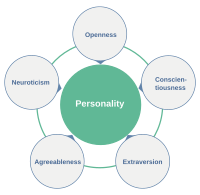
Photo from wikipedia
In survey measurement, acquiescence bias is a response effect that occurs when respondents agree to the item or the question in the scale regardless of its content. It is assumed… Click to show full abstract
In survey measurement, acquiescence bias is a response effect that occurs when respondents agree to the item or the question in the scale regardless of its content. It is assumed that negative items force participants not to agree with some items. Using the mixture approach, however, is not without a substantial cost on both the structure and the scale psychometric properties. The effects of including negative items in scales is what this study tried to investigate. Therefore, the aim of the study is to empirically evaluate the effects of changing negative items to their equivalent positively worded items on the reliability and the factor structure of psychological scales. It is hypothesized that this approach improves the scale factors structures and reliability. Seven commonly used psychological scales that have both negatively and positively worded items have been selected. The scales were applied on seven different samples with a total number of 4192 participants from a public university in the United Arab Emirates. The results confirmed that changing negative items to their equivalent positively directed items systematically and significantly increased the reliability values as well as improved the factor structure of psychological scales.
Journal Title: Journal of Psychoeducational Assessment
Year Published: 2022
Link to full text (if available)
Share on Social Media: Sign Up to like & get
recommendations!